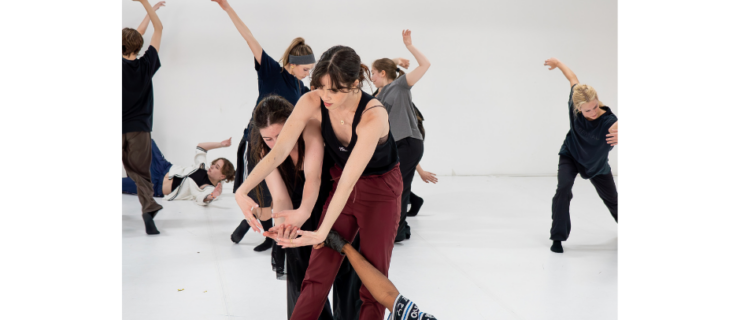Excited. Touched. Stimulated. Taken aback. Revved up. Honored.
I felt all these things watching Akram Khan’s Bahok at City Center tonight. The last feeling, honored, is because I got to moderate a Talkback with him afterwards onstage.
Bahok is a collaboration between the Akram Khan Company, already an international group, and dancers from the National Ballet of China. It works a certain charm, and by the end you feel overwhelmed by its beauty and vulnerability. Parallel streams of consciousness, one of talking and the other of dancing, gave us a view into the eight dancers’ lives. The utter reality of a bunch of people from different countries waiting in an airport (or is it a train station?) with frustration, built up aggressions, wanderings, problems with customs, give rise to both combustion and humor. The dancing was fresh and followed its own inner rhythm; the talking was mundane or fanciful and led us into delightful cultural confusions. Khan likes the word confusion better than fusion, and to allow different stories to overlap or intersect. Somehow a lightness and a heaviness at the same time. A western-ness and an eastern-ness at the same time. I don’t want to throw more words at it except to say it’s the most intriguing and satisfying dance event I’ve seen all year.
One scene: a man starts contracting repeatedly in the upper body, like a violent hiccough that won’t stop. Others, in their different languages, try to find out what’s wrong. Finally he says the word “Stuck!” —the first English word he has uttered. A woman embraces him until his convulsions subside. Another dancer comes to embrace them, and another and another. The last one comes—to dive madly through them.
Another scene: a short South Indian man tries to partner a tall Chinese ballerina, just managing to dodge her slicing limbs—with hilarious results.
During the talkback, Khan spoke about the walls we make in our heads, for instance defining classical ballet or classical Kathak (the form he trained in as a child) while keeping out other influences. He told us that when he asked why Kathak dancers wear bells on their ankles, the answer was simply Because your teacher does, and his teacher did, and so on. Khan asks questions—of himself, of the theater, of the cultural things we all carry in our bodies. The work Bahok is Bengali for “carrier.” He also said that he wasn’t really aware of the brown color of his skin until the terrorist bombing in London in 2005. He had many stories, and the dancers had many stories that made you want to know them better. I don’t think I have ever seen a dance-and-talking piece that was so full of humanity, wit, and vulnerability.
The Akram Khan Company performs Bahok again on Saturday, April 26. It alternates with Zero Degrees, Khan’s collaboration with Sidi Larbi Cherkaoui, which is on April 25 and 27.




